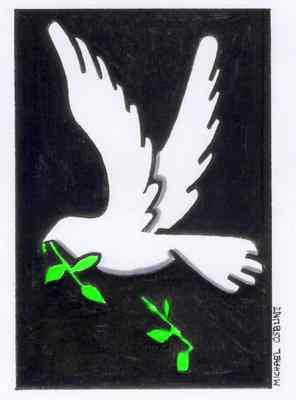- MENU
- HOME
- SEARCH
- WORLD
- MAIN
- AFRICA
- ASIA
- BALKANS
- EUROPE
- LATIN AMERICA
- MIDDLE EAST
- United Kingdom
- United States
- Argentina
- Australia
- Austria
- Benelux
- Brazil
- Canada
- China
- France
- Germany
- Greece
- Hungary
- India
- Indonesia
- Ireland
- Israel
- Italy
- Japan
- Korea
- Mexico
- New Zealand
- Pakistan
- Philippines
- Poland
- Russia
- South Africa
- Spain
- Taiwan
- Turkey
- USA
- BUSINESS
- WEALTH
- STOCKS
- TECH
- HEALTH
- LIFESTYLE
- ENTERTAINMENT
- SPORTS
- RSS
- iHaveNet.com
Obama Faces Reality on Iran, Middle East
by Kenneth T. Walsh

Middle East Peace © Michael Osbun
Iran's missile test makes some skeptical the regime will be conciliatory toward the United States
President Obama's disclosure that Iran has been building a secret uranium enrichment plant underscores a truism in foreign policy: Harsh reality trumps good intentions. Obama says the plant is further evidence of an Iranian nuclear weapons program, and he promises to push even harder for sanctions against the Tehran regime. Administration officials say that, at a special conference in Geneva Thursday, the Iranians will have another chance to prove that they are not building such weapons or to agree to stop such a program. But, with Iran having just completed more missile tests as a defiant gesture, few are expecting conciliation.
Last week's revelation about the uranium facility interrupted the president's campaign of international outreach, which climbed to dizzying heights as he swept through a lengthy series of meetings with other world leaders. He preached cooperation in an address to the
Obama, as usual, was brilliant in the rhetoric and symbolism departments. But this time, he seemed to come up short on results. The Mideast leaders shook hands and posed for photographs but refused to give ground on substantive issues.
Finally, there was Iranian President Mahmoud Ahmadinejad's announcement that Tehran would let its nuclear experts meet with scientists from the United States and other nations to ease concerns about that nuclear program. Critics saw it as a ploy to discourage tougher sanctions.
International conferences, meetings, and "summits" tend to be hyped by the news-hungry media and the PR-focused
But there was little clear progress on Obama's agenda. "He's getting a dose of reality," says a former national security adviser to President George H. W. Bush. "Just because he says something doesn't mean it will take place."
Where Obama did succeed, however, was in demonstrating two important facts: First, George W. Bush, vastly unpopular around the world, is no longer in charge at the
"Those who used to chastise America for acting alone in the world cannot now stand by and wait for America to solve the world's problems alone," Obama told the
In particular, Obama called for new international efforts to contain or eliminate the nuclear programs of Iran and North Korea. He said the two countries "must be held accountable" for violating international standards regarding nuclear-weapons development. "The world must stand together to demonstrate that international law is not an empty promise," Obama said.
Medvedev told reporters at a photo op with Obama that while tougher sanctions are rarely productive, they may be appropriate in the case of Iran. U.S. officials immediately seized on the comments as evidence of a change in Russia's past opposition to those sanctions, but it was unclear how far Medvedev was willing to go. Some observers suggested that this mildly supportive approach by Medvedev was a favorable reaction to Obama's scrapping of a plan to install a new missile defense system in Eastern Europe, which had been designed to deter Russia. Instead, Obama now favors a more limited defense "shield" aimed at deterring Iran.
Earlier, Obama met with Netanyahu and Abbas in a session that seemed to go nowhere. Obama told the two leaders that he was impatient with the pace of talks over the status of Israeli settlements in Palestinian territory and that he wanted them to proceed with more far-reaching peace talks, U.S. officials said. There was little evidence that he had much impact. Still, Obama told reporters, "permanent status negotiations must begin and begin soon. It is past time to talk about starting negotiations. It is time to move forward." Israeli and Palestinian representatives are scheduled to gather in Washington this week to meet with U.S. Mideast envoy George Mitchell to try to jump-start the peace process.
Obama called attention to another item on his to-do list. He told a U.N. conference on climate change, also in New York, that the world's nations needed to work together to avoid "an irreversible catastrophe" because of global warming. And, on behalf of the United States, he accepted part of the blame for emissions that cause the problem.
But he said Americans and his administration are determined to do better. "We understand the gravity of the climate threat," Obama said. "We are determined to act. And we will meet our responsibility to future generations."
The problem is that the administration's proposals to reduce climate change have stalled in
WORLD NEWS & CURRENT EVENTS ...
WORLD | AFRICA | ASIA | EUROPE | LATIN AMERICA | MIDDLE EAST | UNITED STATES | ECONOMICS | EDUCATION | ENVIRONMENT | FOREIGN POLICY | POLITICS
© Tribune Media Services